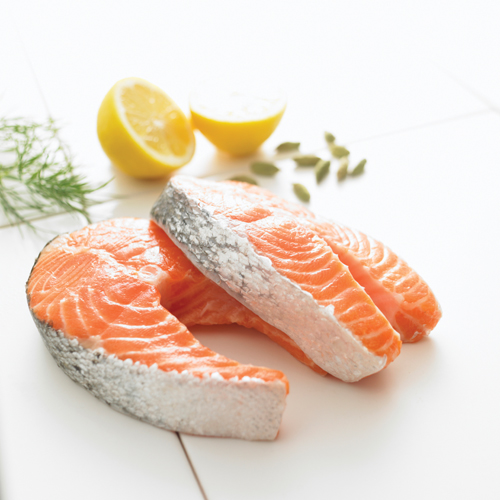Something's fishy
Now that you’re eating for two, you’ve got to up […]
Now that you’re eating for two, you’ve got to up the nutrient intake—and taking a prenatal vitamin is a good place to start. But in addition to one-a-days, healthcare providers often stress the importance of getting enough DHA (docosahexaenoic acid) during pregnancy. This omega-3 fatty acid superstar is essential for fetal brain development, and it doesn’t always appear on the ingredient list of your prenatal vitamin. Fortunately, there are plenty of easy ways to incorporate it into your diet, and it’s readily available in supplement form as well.
Here’s a look at why DHA is important and what you can do to make sure both you and baby are getting enough.

DHA—the brain’s preferred type of fat—helps with overall brain and nervous system functioning. Meeting the daily recommended value supports eyesight, mental, psychomotor and neurological development in infants. There are benefits for mom too, such as a lower risk for heart disease and better brain health.
Around the fifth week of pregnancy, baby’s brain is already beginning to develop, so thinking about your daily consumption of DHA from the onset is essential for healthy growth, says Lindsay Stenovec, RD/RDN, CLEC, a dietician and nutritionist in San Diego, California. “DHA plays a major role in early development and functioning of the brain and central nervous system,” she notes.
And those payoffs continue even after baby is born. “Research studies on DHA in pregnancy suggest that adequate intake of DHA is associated with improved memory, cognitive functioning and behavioral regulation after birth,” Stenovec says.
Gone fishing
Rachel Brandeis, MS, RD, a private practice dietician in Atlanta, recommends eating fish throughout pregnancy as a healthy way to glean DHA from your diet. Although it’s true that not all fish is safe to consume during pregnancy, Brandeis warns that avoiding the stuff from the sea can be just as risky. “You and your baby need omega-3 fatty acids, and oily fish are high in DHA,” she says. “Pregnant women should aim to eat 8 to 12 ounces of safe seafood each week.”
When it comes to getting enough DHA, not all fish and seafood are created equal, so it’s important to make sure you’re taking DHA-rich and low mercury bites. Adiana Castro, MS, RDN, co-founder of Compass Nutrition LLC in New York City, recommends fresh water or wild caught fish versus farm-raised, and she reminds diners to always make sure their catch has been well cooked. Smart choices of fish and seafood include tilapia, cod, salmon, crab, shrimp and sardines.
Not a fish fan? Lily Nichols, RDN, a private practice dietician and nutritionist in Los Angeles, says that other animal foods, including grass-fed beef and eggs from pastured hens, are also good sources of DHA.
If you’re vegetarian or vegan, keep in mind that alternate sources of omega-3s will not supply you with the DHA you need. “I speak with a lot of women [who are] trying to get their omega-3s from flaxseeds, chia seeds and walnuts. While these are healthy for other reasons, they contain no DHA, and our bodies can only convert 1.9 to 3.8 percent into DHA,” Nichols says. If you practice a specialized diet, you’ll want to opt for a supplement made from marine algae (which is where the DHA in fish comes from anyway).
Supplemental materials
For expectant women who are on a strict diet or averse to seafood, Castro suggests picking up a DHA supplement at the local drugstore or ordering one online. There are a variety to choose from, including capsule, liquid and gummy options, so you can pick the one that’s best suited to your needs and taste. When choosing a supplement, Castro advises that moms be careful about contamination. Look for products with the U.S. Pharmacopeia (USP) label, which indicates the purity has been inspected and approved by a third party, or check for supplements that are clean and contaminant-free at ConsumerReports.com. Your healthcare provider likely also has a recommendation, so make a note to ask at your next appointment.
After baby
Brain, eye and nervous system development continues during baby’s first six months of life, and DHA remains a key player. If you’re breastfeeding, your breast milk will provide baby with the DHA he needs. So as long as you’re getting enough DHA, your nursling is too. If you’re bottle-feeding, talk to your pediatrician about using an infant formula that’s supplemented with DHA.







